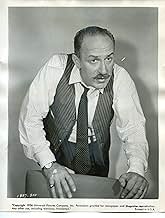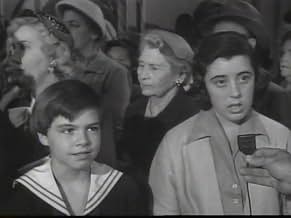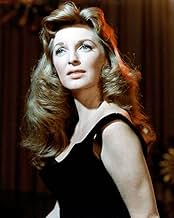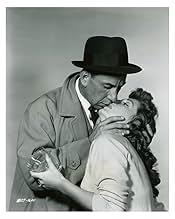Füge eine Handlung in deiner Sprache hinzuJoe Harris, preparing a eulogy for popular radio commentator Herb Fuller, finds that nobody has a good word to say about him.Joe Harris, preparing a eulogy for popular radio commentator Herb Fuller, finds that nobody has a good word to say about him.Joe Harris, preparing a eulogy for popular radio commentator Herb Fuller, finds that nobody has a good word to say about him.
- Nominiert für 1 BAFTA Award
- 3 Nominierungen insgesamt
Edward Platt
- Dr. O'Connor
- (as Edward C. Platt)
Dorothy Abbott
- Stewardess
- (Nicht genannt)
Walter Bacon
- Mourner
- (Nicht genannt)
Empfohlene Bewertungen
I've often been chastised for posting obits in which I have been less than flattering about the person who has passed on; not nasty by any means, merely truthful about their shortcomings. In "The Great Man" that is the dilemma facing Jose Ferrer; should he sing the praises of the 'Great Man' of the title, a recently deceased and much loved, at least by the people who only saw his public face, radio and television personality or should he tell the truth and expose him for the monster he was.
Ferrer's film came out around the same time as Elia Kazan's "A Face in the Crowd" and while Kazan's film, which plays out in much the same ballpark, has gone on to become a classic, Ferrer's remains virtually unseen; personally I think it's a great picture, a testament to Ferrer's often undervalued talent. There are no great cinematic flourishes here, as there are in "Citizen Kane", another film that Ferrer's has often been compared to. This is a simple, literary piece, almost a series of talking heads as Ferrer, who also stars, interviews those who knew 'the great man', including his mistress, an excellent Julie London, and best of all, Ed Wynn as the man who first discovered him. Wynn's magnificent here, (he was nominated for both the Golden Globe and a BAFTA), and Ferrer is canny enough to give him his dues. As Wynn describes his feelings Ferrer allows his camera to slowly creep up on him. He only has this one scene but it's one of the great performances by an actor in a supporting role. His son Keenan is also superb as another executive out for what he can get. As I've said, this movie is almost impossible to see, at least here in the UK, but if you get the chance take it; it's one of the best American films of the fifties.
Ferrer's film came out around the same time as Elia Kazan's "A Face in the Crowd" and while Kazan's film, which plays out in much the same ballpark, has gone on to become a classic, Ferrer's remains virtually unseen; personally I think it's a great picture, a testament to Ferrer's often undervalued talent. There are no great cinematic flourishes here, as there are in "Citizen Kane", another film that Ferrer's has often been compared to. This is a simple, literary piece, almost a series of talking heads as Ferrer, who also stars, interviews those who knew 'the great man', including his mistress, an excellent Julie London, and best of all, Ed Wynn as the man who first discovered him. Wynn's magnificent here, (he was nominated for both the Golden Globe and a BAFTA), and Ferrer is canny enough to give him his dues. As Wynn describes his feelings Ferrer allows his camera to slowly creep up on him. He only has this one scene but it's one of the great performances by an actor in a supporting role. His son Keenan is also superb as another executive out for what he can get. As I've said, this movie is almost impossible to see, at least here in the UK, but if you get the chance take it; it's one of the best American films of the fifties.
Josè Ferrer both directed and starred for the first time in this movie that is a bit reminiscent of CITIZEN KANE about the true story of a famous journalist. Despite is not a classic like KANE, it's still pretty good.
Radio reporter Herb Fuller is killed in an car accident and this causes crisis in the ABC radio station. Joe Harris (Ferrer), his replacement, has to do as first assignment a one hour show discussing the life and career of the deceased journalist. As he interviews fans and the people that knew him, Harris discovers that the man hasn't really a nice reputation as it seemed. How he will discuss its life? See the film by yourself.
Josè Ferrer directs nicely and his performance is what lifts the movie. As always he has lots of charisma and no-nonsense lilt. He is surrounded by various supporting actors of those years: Edward Platt, Keenan Wynn, Jim Backus, Lyle Talbot and even gorgeous Julie London as one of Fuller's former girlfriends. However, while not a classic, it's still a very good movie in its own way and worth seeing as well.
Radio reporter Herb Fuller is killed in an car accident and this causes crisis in the ABC radio station. Joe Harris (Ferrer), his replacement, has to do as first assignment a one hour show discussing the life and career of the deceased journalist. As he interviews fans and the people that knew him, Harris discovers that the man hasn't really a nice reputation as it seemed. How he will discuss its life? See the film by yourself.
Josè Ferrer directs nicely and his performance is what lifts the movie. As always he has lots of charisma and no-nonsense lilt. He is surrounded by various supporting actors of those years: Edward Platt, Keenan Wynn, Jim Backus, Lyle Talbot and even gorgeous Julie London as one of Fuller's former girlfriends. However, while not a classic, it's still a very good movie in its own way and worth seeing as well.
Jose Ferrer should be better known as a director. Yes, it has some of the plot of Well's Kane, but it has more of the feel of a Jack Webb flick, he himself a greatly under rated director. Even Julie London, Webb's wife is in it.. Hard boiled hero, quirky supporting characters that are given a rounded humanity, and a great cast. See this film when it plays on Turner. And check out Webb's non Dragnet films; 30, the DI, Pete Kelly's Blues and The last time I saw Archie.
The immense influence Orson Welles' CITIZEN KANE (1941) has had on the language of cinema is well documented. So, to a lesser degree, is the freedom it gave film-makers – not always of comparable talent – towards (vaguely autobiographical) self-indulgence in their work. Yet another ripple it undeniably created (actually borrowed from THE POWER AND THE GLORY {1933}, which I own but have yet to watch!) led to a whole series of films taking a sour look at the American dream, depicting – via their flashback structure – the rise and fall of a successful but, at heart, unscrupulous public figure. Among these are RUTHLESS (1948), ALL ABOUT EVE (1950), THE BAD AND THE BEAUTIFUL (1952), Welles' own MR. ARKADIN aka CONFIDENTIAL REPORT (1955), THE Oscar (1966), etc.
THE GREAT MAN, then, is one such effort – and an unfairly neglected example into the bargain (even if both the Leslie Halliwell and Leonard Maltin movie guides are duly complimentary in their assessment) which rather suggests that it stands up better than other, more renowned titles in this vein! It also emerges as the most significant directorial venture by star/co-writer Ferrer. For the record, I own all 7 of the pictures he helmed – but, perhaps tellingly, this was only the second I have checked out (and which I opted to watch on the occasion of his birthday). Given the Oscar winner's reputation as a thespian, his choice of 'personal' projects was – for the most part – curiously bland and commercial in nature!
Setting this apart from the established formula is the fact that the subject of the expose' is never shown; we only learn about him – and, consequently, formulate our own opinion – from the way others (who knew him intimately, professionally or just vicariously through his popular radio show) react to news of his passing in a traffic accident. Besides, running concurrently with the main plot (the compiling of information by a small-time radio personality – played by Ferrer himself – for a "heart-rending" eulogy, to be delivered in a live broadcast by the network to commemorate "the great man") are the hero's conflicting emotions about his increasingly unpleasant and "phoney" task especially since he was being all but promoted as the deceased's successor on the airwaves!
Ultimately, the trump-cards here – which make all the difference – are the smartly cynical script (co-adapted by novel author Al Morgan) and a first-rate cast that, apart from Ferrer (in fine form), includes: real-life father and son Ed and Keenan Wynn (credited with, respectively, discovering and nurturing the ungrateful and opportunistic titular character); Julie London (as a chanteuse and his alcoholic mistress); and Dean Jagger (as the Machiavellian network head). Incidentally, the copy I viewed of this one was pretty substandard for the digital era (which has well and truly spoiled us movie-buffs, it must be said!) and, while a somewhat better-quality version does exist online, I had difficulty acquiring it...
THE GREAT MAN, then, is one such effort – and an unfairly neglected example into the bargain (even if both the Leslie Halliwell and Leonard Maltin movie guides are duly complimentary in their assessment) which rather suggests that it stands up better than other, more renowned titles in this vein! It also emerges as the most significant directorial venture by star/co-writer Ferrer. For the record, I own all 7 of the pictures he helmed – but, perhaps tellingly, this was only the second I have checked out (and which I opted to watch on the occasion of his birthday). Given the Oscar winner's reputation as a thespian, his choice of 'personal' projects was – for the most part – curiously bland and commercial in nature!
Setting this apart from the established formula is the fact that the subject of the expose' is never shown; we only learn about him – and, consequently, formulate our own opinion – from the way others (who knew him intimately, professionally or just vicariously through his popular radio show) react to news of his passing in a traffic accident. Besides, running concurrently with the main plot (the compiling of information by a small-time radio personality – played by Ferrer himself – for a "heart-rending" eulogy, to be delivered in a live broadcast by the network to commemorate "the great man") are the hero's conflicting emotions about his increasingly unpleasant and "phoney" task especially since he was being all but promoted as the deceased's successor on the airwaves!
Ultimately, the trump-cards here – which make all the difference – are the smartly cynical script (co-adapted by novel author Al Morgan) and a first-rate cast that, apart from Ferrer (in fine form), includes: real-life father and son Ed and Keenan Wynn (credited with, respectively, discovering and nurturing the ungrateful and opportunistic titular character); Julie London (as a chanteuse and his alcoholic mistress); and Dean Jagger (as the Machiavellian network head). Incidentally, the copy I viewed of this one was pretty substandard for the digital era (which has well and truly spoiled us movie-buffs, it must be said!) and, while a somewhat better-quality version does exist online, I had difficulty acquiring it...
This is a very interesting film for a variety of reasons. In many ways, it's a CITIZEN KANE knock-off, but sometimes in reverse. We see the reporter who is putting together the story of the great man, but we never see the great man himself. As in "Kane," the ex-wife is an alcoholic singer. There is also a "Rosebud" of sorts-a deathbed obscenity. Well worth watching!
Wusstest du schon
- WissenswertesLoosely based on the career of Arthur Godfrey.
- PatzerWhen Joe, Mike, and Jinny are listening to the "blood bank" tape, the VU meter has no relation to the audio.
- Zitate
Ginny: Feet of clay, huh?
Joe Harris: Right up to the knees, at least.
- Crazy CreditsFerrer modestly omitted himself from the cast list at the end of the film.
- VerbindungenVersion of Pretendent (1987)
- SoundtracksThe Meaning of the Blues
Words and Music by Bobby Troup and Leah Worth
Performed by Julie London
[The song comes on the radio in Carol's apartment]
Top-Auswahl
Melde dich zum Bewerten an und greife auf die Watchlist für personalisierte Empfehlungen zu.
Details
- Erscheinungsdatum
- Herkunftsland
- Sprache
- Auch bekannt als
- Marele om
- Drehorte
- Universal Pictures Building, 445 Park Avenue, New York City, New York, USA(Amalgamated Broadcasting building)
- Produktionsfirma
- Weitere beteiligte Unternehmen bei IMDbPro anzeigen
- Laufzeit
- 1 Std. 32 Min.(92 min)
- Farbe
Zu dieser Seite beitragen
Bearbeitung vorschlagen oder fehlenden Inhalt hinzufügen


















